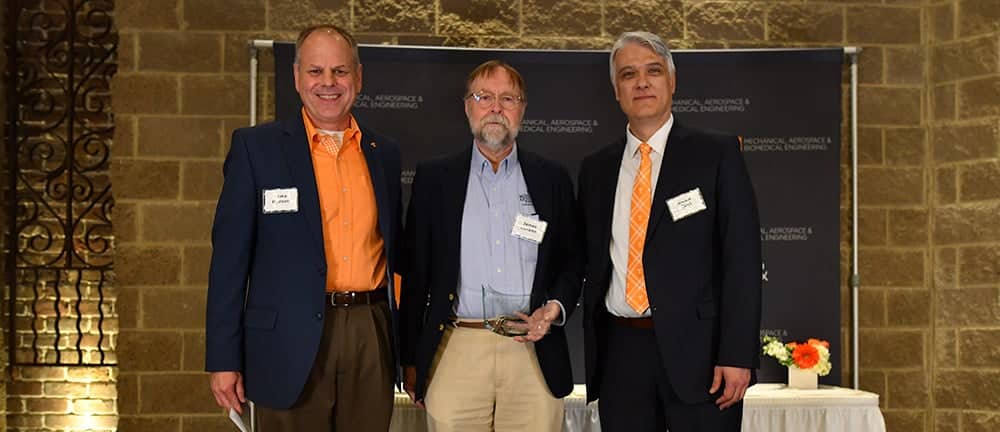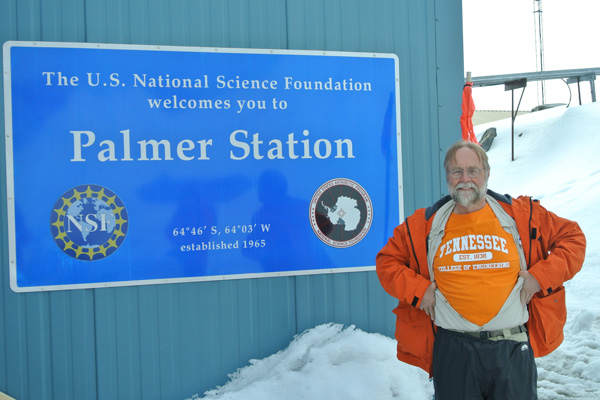
Jim Conklin (’89) heard about the University of Tennessee, Knoxville, when he moved to the area to pursue a career at Oak Ridge National Laboratory and noticed that his coworkers who had attended UT were better prepared for the lab’s advanced research than he was.
“I decided to take courses at UT in engineering and math to better prepare for the job at ORNL,” said Conklin, who also holds engineering degrees from MIT and the University of Connecticut. “I enjoyed the academic environment very much and decided to pursue a PhD. The qualifying exam was the hardest and longest of my life, and I was ecstatic when I passed.”
Conklin is an expert in thermodynamics and heat transfer, which has led to a couple of patents and a slew of challenging but interesting projects researching subjects from nuclear reactor safety to enhanced efficiency HVAC units to automotive and gas turbine engine efficiency improvements during his 36-year career at ORNL. Before his work at the lab, Conklin was a commissioned US Air Force officer at Cape Canaveral, Florida, as a propulsion engineer launching military satellites on the Titan IIIC launch vehicle.
For his exceptional career in engineering, Conklin was recently honored by UT with an Accomplished Alumni Award.
“We were proud to present Dr. Conklin with the award at the Mechanical, Aerospace, and Biomedical Engineering Department spring banquet,” said Kivanc Ekici, MABE department head. “Dr. Conklin has been an invaluable resource to our students, even working as an adjunct professor for several years teaching thermodynamics and heat transfer and serving on thesis committees. His career alone is impressive, but his service to UT and this department is equally exceptional.”
In addition to his voluntary and professional service to UT, Conklin and his wife, Carol, generously funded a faculty fellowship in the department. They also set up planned gifts to support future scholarships and a professorship in MABE. Carol owned a pet-grooming business, and both have a passion for animals, so they also chose to support the UT Veterinary Medical Center.
Outside of their careers and caring for their many animals, Conklin and his wife have traveled extensively.
“I have always enjoyed traveling to meet new people and places, and I have learned that for the most part people are happy to welcome strangers in the countries I’ve visited,” said Conklin.
“I decided to take courses at UT in engineering and math to better prepare for the job at ORNL,” said Conklin, who also holds engineering degrees from MIT and the University of Connecticut. “I enjoyed the academic environment very much and decided to pursue a PhD. The qualifying exam was the hardest and longest of my life, and I was ecstatic when I passed.”
Conklin is an expert in thermodynamics and heat transfer, which has led to a couple of patents and a slew of challenging but interesting projects researching subjects from nuclear reactor safety to enhanced efficiency HVAC units to automotive and gas turbine engine efficiency improvements during his 36-year career at ORNL. Before his work at the lab, Conklin was a commissioned US Air Force officer at Cape Canaveral, Florida, as a propulsion engineer launching military satellites on the Titan IIIC launch vehicle.
For his exceptional career in engineering, Conklin was recently honored by UT with an Accomplished Alumni Award.
“We were proud to present Dr. Conklin with the award at the Mechanical, Aerospace, and Biomedical Engineering Department spring banquet,” said Kivanc Ekici, MABE department head. “Dr. Conklin has been an invaluable resource to our students, even working as an adjunct professor for several years teaching thermodynamics and heat transfer and serving on thesis committees. His career alone is impressive, but his service to UT and this department is equally exceptional.”
In addition to his voluntary and professional service to UT, Conklin and his wife, Carol, generously funded a faculty fellowship in the department. They also set up planned gifts to support future scholarships and a professorship in MABE. Carol owned a pet-grooming business, and both have a passion for animals, so they also chose to support the UT Veterinary Medical Center.
Outside of their careers and caring for their many animals, Conklin and his wife have traveled extensively.
“I have always enjoyed traveling to meet new people and places, and I have learned that for the most part people are happy to welcome strangers in the countries I’ve visited,” said Conklin.
He has visited three of the world’s major waterfalls (Victoria Falls in Africa, Iguazu Falls in South America, and Niagara Falls in North America), set foot on all seven continents, and completed polar plunges in the Arctic and Antarctic Oceans.
“I chose to visit both polar areas to see what the explorers of over 100 years ago experienced and to appreciate what humans endured to explore the unknown,” said Conklin. “It’s awe-inspiring to learn how people and animals live in different climates.”
“I chose to visit both polar areas to see what the explorers of over 100 years ago experienced and to appreciate what humans endured to explore the unknown,” said Conklin. “It’s awe-inspiring to learn how people and animals live in different climates.”

Travel is a passion motivated by the same desire to learn and challenge himself that guided him to engineering.
“I’m the first in my extended family to attend college and the only college graduate in my immediate family,” said Conklin. “I had many faculty mentors at all the universities I attended, but the person with the most influence on me was my doctorate dissertation major professor at UT, Dr. Robert J. Krane. He honed my innate curiosity substantially about how physics and math can describe real-world performance and help improve that performance.”
Conklin’s legacy is one of lifelong learning. Now, having received an Accomplished Alumni Award, he is grateful for this full-circle moment to recognize the part UT played in his pursuit of knowledge and his professional success.
“I was thrilled to receive an Accomplished Alumni Award from UT,” said Conklin. “It was an unexpected honor, and I’m glad for the chance to reflect on the significant part UT has played in my career, especially at ORNL. I’ve enjoyed many professional opportunities thanks to my academic experience here, and it’s been a joy to give back through leadership, finances, and sharing of knowledge.”
“I’m the first in my extended family to attend college and the only college graduate in my immediate family,” said Conklin. “I had many faculty mentors at all the universities I attended, but the person with the most influence on me was my doctorate dissertation major professor at UT, Dr. Robert J. Krane. He honed my innate curiosity substantially about how physics and math can describe real-world performance and help improve that performance.”
Conklin’s legacy is one of lifelong learning. Now, having received an Accomplished Alumni Award, he is grateful for this full-circle moment to recognize the part UT played in his pursuit of knowledge and his professional success.
“I was thrilled to receive an Accomplished Alumni Award from UT,” said Conklin. “It was an unexpected honor, and I’m glad for the chance to reflect on the significant part UT has played in my career, especially at ORNL. I’ve enjoyed many professional opportunities thanks to my academic experience here, and it’s been a joy to give back through leadership, finances, and sharing of knowledge.”